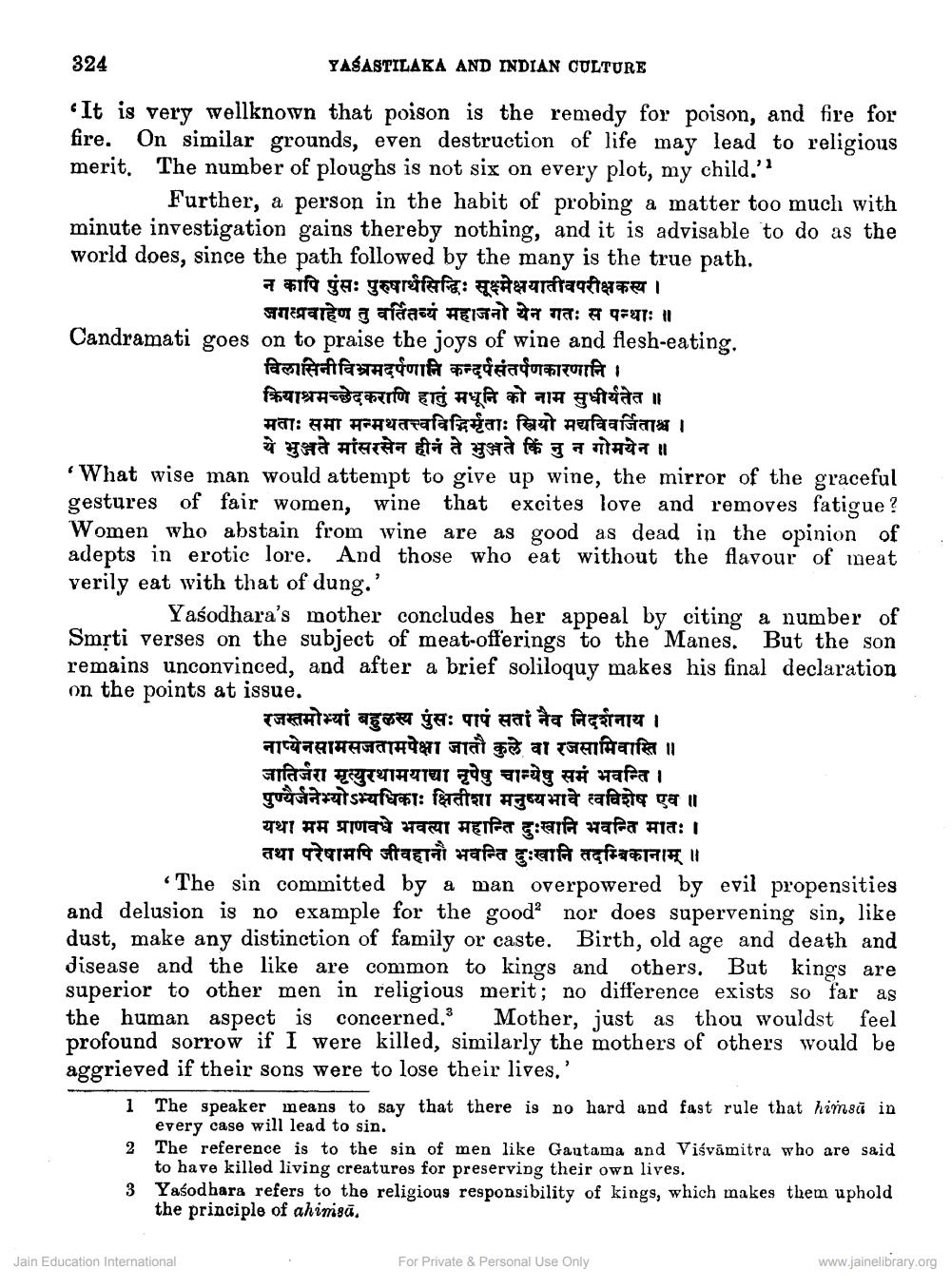________________
324
YASASTILAKA AND INDIAN CULTURE
48.
It is very wellknown that poison is the remedy for poison, and fire for fire. On similar grounds, even destruction of life may lead to religious merit. The number of ploughs is not six on every plot, my child."
Further, a person in the habit of probing a matter too much with minute investigation gains thereby nothing, and it is advisable to do as the world does, since the path followed by the many is the true path.
न कापि पुंसः पुरुषार्थसिद्धिः सूक्ष्मेक्षयातीवपरीक्षकस्य ।
जगत्प्रवाहेण तु वर्तितव्यं महाजनो येन गतः स पन्थाः ॥ Candramati goes on to praise the joys of wine and flesh-eating,
विलासिनीविभ्रमदर्पणानि कन्दर्पसंतर्पणकारणानि । क्रियाश्रमच्छेदकराणि हातुं मधूनि को नाम सुधीर्यतेत ॥ मताः समा मन्मथतत्त्वविद्भिर्मृताः स्त्रियो मद्यविवर्जिताश्च ।
ये भुञ्जते मांसरसेन हीनं ते भुञ्जते किं नु न गोमयेन ॥ What wise man would attempt to give up wine, the mirror of the graceful gestures of fair women, wine that excites love and removes tigue? Women who abstain from wine are as good as dead in the opinion of adepts in erotic lore. And those who eat without the flavour of meat verily eat with that of dung.'
Yasodhara's mother concludes her appeal by citing a number of Smrti verses on the subject of meat-offerings to the Manes. But the son remains unconvinced, and after a brief soliloquy makes his final declaration on the points at issue.
रजस्तमोभ्यां बहलस्य पुंसः पापं सतां नैव निदर्शनाय । नाप्येनसामसजतामपेक्षा जातौ कुले वा रजसामिवास्ति । जातिर्जरा मृत्युरथामयाचा नृपेषु चान्येषु समं भवन्ति । पुण्यैर्जनेभ्योऽभ्यधिकाः क्षितीशा मनुष्यभावे त्वविशेष एव । यथा मम प्राणवधे भवत्या महान्ति दुःखानि भवन्ति मातः ।
तथा परेषामपि जीवहानौ भवन्ति दुःखानि तदम्बिकानाम् ॥
The sin committed by a man overpowered by evil propensities and delusion is no example for the good nor does supervening sin, like dust, make any distinction of family or caste. Birth, old age and death and disease and the like are common to kings and others. But kings are superior to other men in religious merit; no difference exists so far as the human aspect is concerned. Mother, just as thou wouldst feel profound sorrow if I were killed, similarly the mothers of others would be aggrieved if their sons were to lose their lives.'
1 The speaker means to say that there is no hard and fast rule that hiinsä in
every case will lead to sin. 2 The reference is to the sin of men like Gautama and Viśvāmitra who are said
to have killed living creatures for preserving their own lives. 3 Yaśod hara refers to the religious responsibility of kings, which makes them uphold
the principle of ahimsā.
Jain Education International
For Private & Personal Use Only
www.jainelibrary.org




